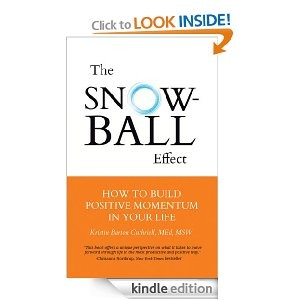 Is your marriage snowballing out of control? Do you know what direction you are heading? Do you need to turn your momentum around? Today we will look at four warning signs, or a chain of events, that signal to us that our marriage may be heading in the wrong direction. If all four warning signs are present in your marriage, you may know that your marriage is in trouble, but you may not know how it got there or how to fix it.
Is your marriage snowballing out of control? Do you know what direction you are heading? Do you need to turn your momentum around? Today we will look at four warning signs, or a chain of events, that signal to us that our marriage may be heading in the wrong direction. If all four warning signs are present in your marriage, you may know that your marriage is in trouble, but you may not know how it got there or how to fix it.
For those of you who follow what I write, you know that I write about snowball effects. You know that I write about how to create a positive snowball effect in life and how to avoid the negative snowball effect- all based on research, clinical experience, and personal experience. For those who don’t know or haven’t read my book, The Snowball Effect: How to Build Positive Momentum in Your Life, a snowball effect is a figurative term for something that starts out small and builds into something much bigger, picking up momentum along the way. Sometimes the building process is so slow that we are unaware of which direction we are heading until we are really in trouble.
The four warning signs will wake you up and make you aware in case your marriage is snowballing in the wrong direction.
If we know the signs that tell us that our marriage is heading in the wrong direction, we can make changes before things spiral to the point of no return. Many couples who end up calling it quits, know things are bad, but don’t really know how they got SO bad- bad enough to think that divorce is the only option. They often think, “What happened to us? How did it ever get this bad?” They often think it was the affair that ruined the marriage, without realizing that some form of emotional disconnection or communication breakdown happened long before the affair. They may think that they just grew apart without realizing that there may have been things going on in the relationship that caused them to grow apart in the first place.
In Dr. John Gottman’s book, Why Marriages Succeed or Fail, he explains a destructive sequence of events that sometimes lead to divorce. After spending many years researching couples, he believes that being aware of these warning signs can make all the difference in the world. You see, you won’t be able to get off the slippery slope if you don’t even know that you are on it. Knowing that your marriage is snowballing in a destructive direction may lead you to make behavioral changes and turn your momentum around.
John Gottman calls these four warning signs The Four Horseman.
The First Horseman: Criticism
Criticism and complaining may look similar, but they are not. You see, complaining focuses on a person’s behavior and criticism attacks the character of a person. Complaining is stating what I need from you. Criticism implies you are flawed. Complaining is often necessary so that resentment doesn’t build. You may need to ask your spouse to pick up his or her clothes otherwise you suppress the bothersome behavior and bitterness sets in. When your partner is complaining, it is important to acknowledge and discuss your partner’s concern. If the complaining is ignored, it may turn to criticism due to their elevating frustration. “Will you stop leaving your clothes on the floor?” (for the 60th time) may turn into “You are so lazy!” When criticism or personal attacks enter the relationship the second horseman usually follows.
The Second Horseman: Contempt
When people have their character attacked rather than just their behavior, their actions often become contemptuous. They want to hurt back. Through their words and body language, their goal is to emotionally injure their partner because they have been so emotionally injured themselves. The difference between criticism and contempt is criticism is driven by frustration and is not done with the motivation to intentionally injure. Contempt comes from a place of significant hurt, is driven by anger, and is meant to emotionally wound the other. Once contempt enters a relationship, people forget their partner’s good qualities and focus only on the hurtful things their partner has said and done. Gottman says recognizing contempt is not difficult. It comes in the form of name-calling, mockery, and hostile humor.
The Third Horseman: Defensiveness
Once contempt enters a relationship it is easy to understand why defensiveness would follow. It is only natural to want to defend your character and yourself as a person. The only problem is that defensiveness just makes things escalate. It separates you one step further from your partner. When we are defensive we are too busy to peel back the onion and look below the surface to see what is causing our partner’s criticism and contempt. We are so busy attacking back, looking for examples to counter our partner’s assessment of our character, or repeating our position, that we don’t take the time to really listen to what our partner is trying to tell us. John Gottman says, “The first step toward breaking out of defensiveness is to no longer see your partner’s words as an attack but as information that is being strongly expressed. Try to understand and empathize with your partner. This is admittedly hard to do when you feel under siege, but it is possible and its effects are miraculous.”
The Fourth Horseman: Stonewalling
When a couple is exhausted from the criticism, the contempt, and the defensiveness, stonewalling often occurs. This is when one partner has had enough and shuts down. Talking to a shut down partner feels like talking to a brick wall. No emotion. No response. Gottman states, “The fourth horseman need not mark the end of a relationship. But if your interactions have deteriorated to this extent you are at great risk of catapulting even further down the marital cascade- becoming so overwhelmed by negativity in your relationship that you end up divorced, separated, or living lonely, parallel lives in the same home. Once the fourth horseman becomes a regular resident, it takes a good deal of hard work and soul-searching to save the marriage.”
Tips to Turning the Momentum Around and Creating a Positive Snowball Effect in Your Marriage
1. No personal attacks, no name calling, no covert anger being expressed as humor, no belittling! You can complain about a behavior, but don’t attack your partner’s character. On the other hand, if your partner is complaining about something, listen. It may not seem important to you, but it is important to them. When you ignore their request or complaint and deem it as unimportant, your partner feels unimportant to you. When your partner feels unimportant to you, their complaining is more likely to turn to criticism and the first horseman has arrived.
2. When you are personally attacked by your partner, know that it is coming from a place of hurt and frustration. Try not to attack back, otherwise you are sending an invitation to the second horseman. Instead, talk to your partner and find out what is bothering him or her. Find out what the frustration is behind the criticism.
3. Listen to what your partner is trying to say without defending your position. See if you can find even a little bit of truth in what he or she is saying. Maybe this will provide you with an area of needed growth. Remember, if you shut your partner down by becoming defensive, he or she may give up trying to talk to you at all. When they shut you out, the fourth horseman has shown up at your door. Try to let your spouse back in, not the horseman.
4. Knowing these four warning signs may help you avoid them altogether. If the fourth horseman has already entered your marriage, seek professional help. It is not too late to peel back the onion and learn how to communicate hurt, anger, and frustration without wounding your partner or your marriage.
Source: Gottman, John. (1995). Why Marriages Succeed and Fail: And How You Can Make Yours Last. New York: Simon & Schuster
 This post was written by Kristin Barton Cuthriell, MEd, MSW, LCSW. Kristin is a licensed psychotherapist, speaker, and author of The Snowball Effect: How to Build Positive Momentum in Your Life. To get the first section of the book free, go to www.thesnowballeffect.com. You will also receive weekly tools and techniques that will help you find greater peace in life.
This post was written by Kristin Barton Cuthriell, MEd, MSW, LCSW. Kristin is a licensed psychotherapist, speaker, and author of The Snowball Effect: How to Build Positive Momentum in Your Life. To get the first section of the book free, go to www.thesnowballeffect.com. You will also receive weekly tools and techniques that will help you find greater peace in life.
Image Source: www.mindyummy.wordpress.com
Great advice
Thank you!
Good stuff! Thanks for sharing!
Thank you for sharing it on twitter! I recently saw a post you wrote about the importance of keeping the communication flowing with our children. So true! We want to stay away from the “Four Horseman” there as well as in our marriage! Thank you!
This is excellent!
Thank you!
People have to be able to talk to each other and not put each other down. Once the personal criticism starts, you know the criticizer is unhappy and there’s trouble ahead. (And of course the recipient of the criticism is unhappy too.)These are really good points, Kristin.
So true, Anneli! Thank you!
That is some powerful stuff. Though I have a great marriage built from a foundation of love and respect, some my “other” relationships — ones I have always held dear — are not. These are good words to live by, married or not. I’m glad that I was able to recognize what could not be repaired and cross over the bridge to my ultimate salvation. Thanks, Kristin, for your insight.
I’m imsepesrd you should think of something like that